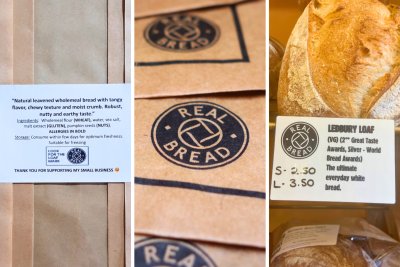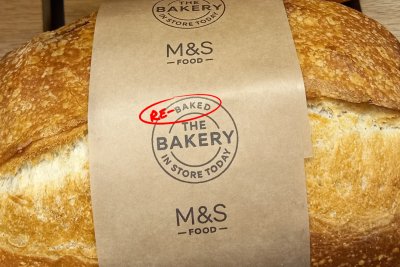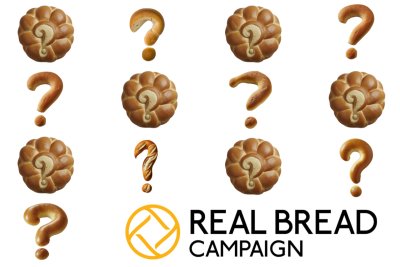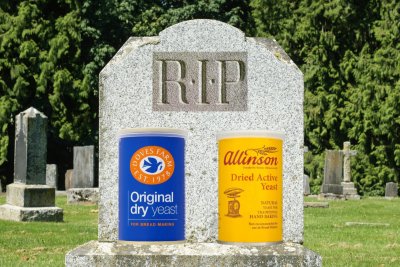Real Bread Campaign urges government to reject 'sourfaux code'
Letter sent to ministers and consumer protection bodies.
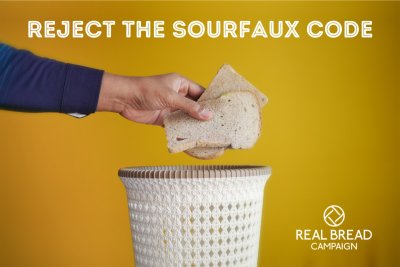
On 6 February, the Real Bread Campaign emailed the following letter to Thérèse Coffey, Secretary of State for Environment, Food and Rural Affairs; and Mark Spencer, Minister of State at the Department for Environment, Food and Rural Affairs.
Versions of the letter were also emailed to the heads of the Food Standards Agency, Advertising Standards Authority, and Chartered Institue of Trading Standards.
Dear Thérèse and Mark,
We understand that a document titled ‘UK Baking Industry Code of Practice for the Labelling of Sourdough Bread and Rolls’ has been sent to Defra by The Association of Bakery Ingredient Manufacturers (ABIM).
Genuine sourdough bread makers in the Real Bread Campaign network reject this proposed voluntary code. We urge other bakers, the government, consumer protection bodies, retailers and shoppers to say no to sourfaux by doing the same.
Rather than representing the views of the ‘UK Baking Industry’ as a whole, all the proposed code unites is a small number of companies seeking to profit from legitimising using the word sourdough in ways they see fit. The document was produced by a group with vested interests in making, selling and using baker’s yeast and additives, none of which has any place in the process of genuine sourdough bread making.
The proposed code was published without the agreement of the majority of the bakers who make genuine sourdough bread in the UK, many (perhaps most) of whom are in the Real Bread Campaign’s network. The authors are fully aware that the Campaign has been championing Real Bread (including genuine sourdough), as well as the people who make and enjoy eating it, since our inception in 2008. They also know of our continuing lobbying for a meaningful legal definition of the word sourdough and regulation of its use. Despite this, the authors excluded us from the initial drafting process, rejected our input when we learned of the project, and then only informed us of the code’s publication after the fact.
Having shunned sourdough, sometimes in rather disparaging terms, authors of the code came late to the party. As the document notes: ‘a certain degree of skill in dough production and handling is required for successful sourdough bread manufacture.’ It also recognises that the further key element is time.’ Rather than adapting to and adopting the practices and principles established over more than five decades by the custodians of the craft of genuine sourdough bread making in the UK, however, they decided to attempt writing their own rulebook to meet their own needs and capabilities ‘where space and skills are lacking.’
Far from creating clarity, the proposed code is a recipe for continuing consumer confusion that currently exists. Unlike the clear-cut single legal definition that the Real Bread Campaign has proposed to Defra (contained, along with evidence of need and benefit, within the case for a legal definition we sent on 21 January 2021), the ABIM document contains multiple definitions, peppered with qualifiers such as ‘with’, ‘style’ and ‘flavour’. All these would clarify is that if someone saw the word sourdough, they would still need to read (or ask for) the ingredients list to check whether or not they were getting the genuine article. It is not legal to add a dash of whisky or flavouring to a bottle of just-distilled spirit and market it as ‘single malt style’, ‘whisky flavour’, or ‘with Scotch’, nor should this type of ‘weasel words’ loophole exist for products named or marketed using the word sourdough.
To our eyes, the proposed code appears to run contrary to Article 7 of EU Regulation 1169/2011 on the provision of food information to consumers, that food information shall not be misleading, particularly as to the characteristics of the food and, in particular, as to its nature, identity, properties, composition, method of manufacture or production.
The meaningful, legal definition that we propose would help to level the playing field. It would give small, independent bakeries that make genuine sourdough bread a better chance of surviving and thriving – particularly against the marketing might of supermarkets and other industrial manufacturers. It would also help to create fairer competition between the small bakeries that make genuine sourdough and those that use the word to profit from products made using quicker, cheaper means. A voluntary code would not prevent this. Shoppers would see the word sourdough and be left (or perhaps led) to make like-for-like buying choices between genuine sourdough bread and fundamentally different products.
None of what we call for would prevent the use of additives or baker’s yeast. The word sourdough could (and should) still appear on ingredients lists. Baked products could still be manufactured by quicker and cheaper means. In common with the rest of our Honest Crust Act proposals, it would simply help to ensure that shoppers knew what they were getting and so have the chance to make better-informed choices about how they were spending their hard earned and saved income.
We thank Defra for listening to us on the issue of the word wholemeal being used to name and market loaves made from 50% white flour and so reviewing that element of the relevant legislation. Please will you now give an assurance that the government will not adopt or support ABIM’s proposed code of practice?
Please also advise when there will be public consultation on each of the seven Honest Crust Act proposals we submitted to Defra on 16 September 2021. None of these was given adequate discussion in Bread and Flour Technical Working Group meetings, or was included in the public consultation that ran from September to November 2022.
I look forward to your reply.
Yours sincerely,
Chris Young
Real Bread Campaign coordinator
Updates
8 March 2023: Sign the sourfaux code rejection letter
2 March 2023: Mark Spencer emailed a reply to the above letter with a slight variation to his response to Daniel Zeichner MP's written question of 7 February.
7 February 2023: Daniel Zeichner, the Labour MP for Cambridge and Shadow Minister (Environment, Food and Rural Affairs), tabled this written question: 'To ask the Secretary of State for Environment, Food and Rural Affairs, if she will make an assessment of the implications for her policies of the UK Baking Industry Code of Practice for the Labelling of Sourdough Bread and Rolls, published by the Association of Bakery Ingredient Manufacturers on 31 January 2023.'
9 February 2023: The Campaign responded to the reply it received from the ASA.
Published Monday 6 February 2023
Real Bread Campaign: The Real Bread Campaign finds and shares ways to make bread better for us, better for our communities and better for the planet. Whether your interest is local food, community-focussed small enterprises, honest labelling, therapeutic baking, or simply tasty toast, everyone is invited to become a Campaign supporter.
